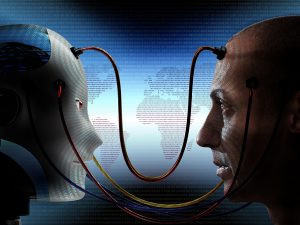 The past year has seen us living with the reality of virtual. Video calls, online meetings, streamed events - the majority of our connections have happened through a screen. While this is our current reality it is not virtual reality in the truest sense. By definition, virtual reality (VR) is being completely immersed in a world that is simulated. Augmented reality (AR) allows a user to move around in the real world while interacting with virtual elements (think Pokemon Go). What we've called "virtual" during the pandemic does not fit these exact criteria but our comfort interacting with a screen and the related technologies does pave the way for virtual and augmented reality solutions to become part of daily work and life.
The past year has seen us living with the reality of virtual. Video calls, online meetings, streamed events - the majority of our connections have happened through a screen. While this is our current reality it is not virtual reality in the truest sense. By definition, virtual reality (VR) is being completely immersed in a world that is simulated. Augmented reality (AR) allows a user to move around in the real world while interacting with virtual elements (think Pokemon Go). What we've called "virtual" during the pandemic does not fit these exact criteria but our comfort interacting with a screen and the related technologies does pave the way for virtual and augmented reality solutions to become part of daily work and life.
- Workforce Connection - Think of a virtual reality meeting as an amped up version of the backgrounds people apply to their zoom meetings to hide the pile of unwashed dishes behind them. A VR/AR meeting would give the appearance and feeling of colleagues sitting around a shared table and offer multiple views of each other as opposed to just head-on camera shots. To make this happen, specialized equipment and software would be required.
- Training - VR and AR are nothing new in the defense space. Warfighters have long been using simulation-based training. These training uses continue to expand and become more sophisticated. Civilian agencies could also benefit from these technologies for occupational safety, especially needed as people begin transitioning back to in-office work.
- Asset Management - The Navy is using VR/AR technology in their digital twin program that allows them to see images of the parts and ships in 3-D along with corresponding data needed to track them. This replaces hard copy forms and spreadsheets that give just flat numbers and point-in-time data, creating a new form of data visualization.
- Virtual Inspections - Inspections are critical to the safety and security of the public, but with health concerns, getting inspectors onto manufacturing floors, into schools and offices, and generally interacting with people in charge of regulated sites has been difficult. The state of Delaware took their inspections virtual, moving a step beyond a video call with inspected entities by using VR/AR technology that allows remote experts to virtually reach out to "touch" areas they want inspectors to examine. Through the application, inspectors can write on the screen, freeze images, use hand gestures, share pictures and add real objects.
Of course, making VR/AR a reality (pun intended) requires some changes in government policy and procedures. That process has been started with the VR TECHS in Government Act. This bill has been sitting in committee, but if enacted would establish a multi-sector advisory committee "to promote the use of reality technology as a tool for professional development for Federal workers, and for other purposes."
If you are interested in exploring the world and applications of AR/VR there are a number of events and resources to guide your journey.
- Future Offices Winter 2021 (January 20-21, 2021; virtual event) - This event brings together technology, real estate, workplace, facility, and design experts for two days of case studies, panel discussion, keynotes, and round table discussions. Topics covered include aligning workplace investments with organizational mission, hybrid and remote working challenges & successes, and what digital workplace necessities prove a return on investment.
- Military Space Situational Awareness 2021 (April 28-29, 2021; virtual event) - This event will bring together leading experts from the UK, US, Europe and beyond, to discuss how we can build a collaborative approach to space management, as well as how to balance operational necessity with responsible use of space. An area of focus will be how to manage further space congestion through policy implementation, technology, best practices and international partnerships, to ensure future sustainable use of space.
- ABC's of Immersive Technologies Workshop (May 6, 2021; virtual workshop) - This workshop will show how augmented reality (AR), virtual reality (VR) and mixed reality (MR) can create value for any organization. The session will also help attendees evaluate solutions to see which ones are best suited for their needs.
- The 21st Century Integrated Digital Experience Act: A mandate to catch up with constituents' digital expectations (data sheet) - Developments in technology are transforming nearly every industry--and government is no exception. Today, federal, state, and local government agencies are seeking to improve the way they engage with constituents online, and how they deliver public services.
- Risk and Reward: A Framework for Federal Innovation (white paper) -- The federal government is one of the most prolific innovators in modern history, sending astronauts to the moon, curing diseases across the globe and helping launch the Internet. To launch and sustain these initiatives, federal leaders brought vision, collaboration and resources to address formidable challenges.
Let us know where you are learning about the applications of VR/AR in government. Share your thoughts in the comments.
Be sure to check out GovEvents for a complete listing of virtual seminars, training, roundtables, webinars, and a library of on-demand events.



